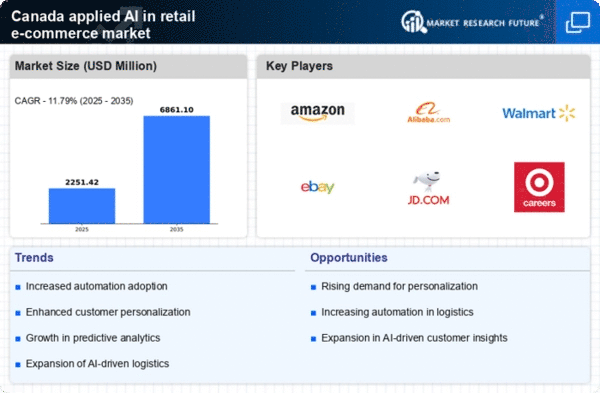Focus on Sustainability
The focus on sustainability is becoming a prominent driver within the applied ai-in-retail-e-commerce market. Canadian consumers are increasingly prioritizing eco-friendly products and practices, prompting retailers to adopt sustainable business models. AI technologies can assist in optimizing supply chains, reducing waste, and improving energy efficiency. For instance, AI-driven analytics can help retailers identify sustainable sourcing options and minimize their carbon footprint. As a result, approximately 60% of Canadian consumers express a willingness to pay a premium for sustainable products. This growing demand for sustainability is likely to propel the adoption of AI solutions that align with environmental goals, thereby influencing the strategic direction of the applied ai-in-retail-e-commerce market.
Growth of Mobile Commerce
The rapid growth of mobile commerce is significantly influencing the applied ai-in-retail-e-commerce market in Canada. With over 50% of online transactions occurring via mobile devices, retailers are increasingly adopting AI technologies to enhance mobile shopping experiences. This trend is characterized by the implementation of AI-driven chatbots, personalized recommendations, and streamlined payment processes. As mobile commerce continues to expand, retailers are compelled to invest in AI solutions that cater to the unique needs of mobile users. The convenience and accessibility offered by mobile platforms are reshaping consumer expectations, prompting retailers to innovate continuously. Consequently, the applied ai-in-retail-e-commerce market is likely to see a surge in AI applications tailored for mobile environments, ensuring that businesses remain relevant in an ever-evolving digital landscape.
Integration of Advanced Analytics
The integration of advanced analytics within the applied ai-in-retail-e-commerce market is becoming increasingly vital for Canadian retailers. By leveraging data analytics, businesses can gain insights into consumer behavior, preferences, and purchasing patterns. This capability allows for more informed decision-making, enhancing operational efficiency and customer satisfaction. According to recent statistics, approximately 70% of Canadian retailers are investing in analytics tools to optimize their supply chains and marketing strategies. The ability to analyze vast amounts of data in real-time enables retailers to respond swiftly to market changes, thereby maintaining a competitive edge. As the demand for personalized shopping experiences grows, the reliance on advanced analytics is likely to intensify, further driving the evolution of the applied ai-in-retail-e-commerce market.
Emergence of Omnichannel Strategies
The emergence of omnichannel strategies is reshaping the applied ai-in-retail-e-commerce market in Canada. Retailers are increasingly recognizing the importance of providing a seamless shopping experience across various channels, including online, in-store, and mobile. AI technologies play a crucial role in facilitating this integration by enabling real-time inventory management, personalized marketing, and customer engagement. Recent data indicates that retailers employing omnichannel strategies experience a 30% increase in customer retention rates. As consumers demand a cohesive shopping experience, the applied ai-in-retail-e-commerce market is likely to witness a growing emphasis on AI solutions that support omnichannel initiatives. This shift not only enhances customer satisfaction but also drives sales growth, making it a pivotal driver in the current retail landscape.
Enhancement of Cybersecurity Measures
The enhancement of cybersecurity measures is increasingly critical in the applied ai-in-retail-e-commerce market. As online shopping continues to rise, so does the risk of cyber threats, making robust security protocols essential for retailers. AI technologies are being employed to detect and mitigate potential security breaches, ensuring the protection of sensitive customer data. Recent reports indicate that cyberattacks on retail websites have increased by 40% in the past year, underscoring the urgency for improved cybersecurity. Retailers are investing in AI-driven security solutions to safeguard their operations and maintain consumer trust. This focus on cybersecurity not only protects businesses but also enhances the overall shopping experience, making it a vital driver in the applied ai-in-retail-e-commerce market.
















